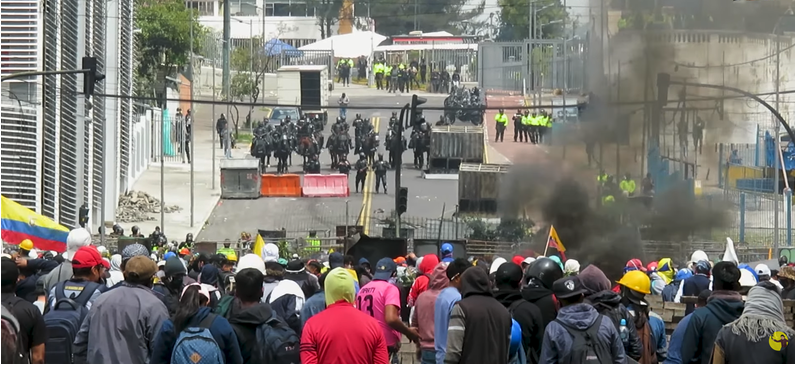Latin America Advisor
Energy Advisor
A Publication of The Dialogue
Will Ecuador’s Oil Industry Continue to Draw Protests?
 In June, protests in Ecuador led by Indigenous groups culminated after two weeks when the Ecuadorean government agreed to a number of demands, including a decrease in the price of fuel. // File Photo: El Blog de Jota via Wikimedia Commons.
In June, protests in Ecuador led by Indigenous groups culminated after two weeks when the Ecuadorean government agreed to a number of demands, including a decrease in the price of fuel. // File Photo: El Blog de Jota via Wikimedia Commons.
Ecuador’s government and the country’s main Indigenous organization reached an agreement on June 30 following more than two weeks of unrest. The protests were related to a number of demands from Indigenous organization Conaie, including a decrease in the price of fuel. Under the agreement, President Guillermo Lasso’s government reduced gasoline prices by 15 cents to $2.40 per gallon, while the price of diesel was lowered by the same amount to $1.75. During the protests, oil output, Ecuador’s main source of revenue, had been cut in half to approximately 234,500 barrels per day, costing the industry about $213 million, according to figures from the energy ministry. Why was the oil sector such a key flashpoint in the protests, and will the agreement between Conaie and the Ecuadorean government be enough to stop future unrest? What are the most important parts of the agreement related to Ecuador’s natural resources as a whole? What is the likelihood of a large-scale oil reform in Ecuador, and what is the outlook for the industry in the wake of the protests?
-
Jose L. Valera, partner at Mayer Brown LLP: “The oil sector was a key flashpoint in the protests because the government had targeted a doubling of the country’s production and a series of reforms to incentivize the private sector to invest in exploration and infrastructure. More than 80 percent of Ecuador’s oil production comes from its Amazon region, and Indigenous organizations viewed this as an affront to their rights of prior consultation. They are opposed to more oil, and minerals generally, being extracted from that…”
Read More
Top News
China’s Ganfeng to Purchase Argentina- Focused Lithea

Citgo Ready to Resume Imports of Venezuelan Oil
Complete editions of the Energy Advisor are delivered weekly to members of the Dialogue's Corporate Program and other subscribers. Sign up below for a free complimentary preview subscription.
About the Energy Advisor
A sister publication of the Inter-American Dialogue’s daily Latin America Advisor, the weekly Energy Advisor captures fresh analysis from business leaders and government officials on the most important developments in oil and gas, biofuels, the power sector, renewables, new technologies, and the policy debates shaping the future of energy in the Western Hemisphere and beyond. To subscribe or for more information, contact Erik Brand, publisher of the Advisor, at ebrand@thedialogue.org.
Subscribers See all














Staff
Erik Brand
Publisher
P. 202.463.2932
E. ebrand@thedialogue.org
Gene Kuleta
Editor
P. 202.463.2920
E. gkuleta@thedialogue.org
Leticia Chacón
Reporter
E. lchacon@thedialogue.org





















